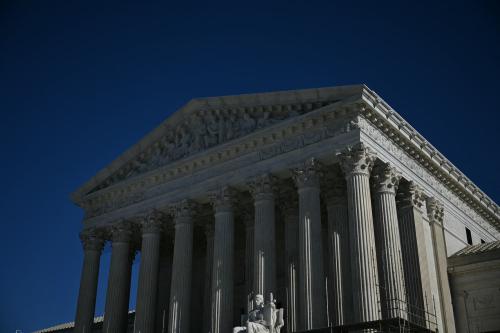Below is an election spotlight from Chapter 6 of the Foresight Africa 2017 report, which explores six overarching themes that provide opportunities for Africa to overcome its obstacles and spur inclusive growth. Read the full chapter on upholding good governance here. For more on African political transitions, see our interactive African Leadership Transitions Tracker.
 General overview
General overview
Recent peaceful post-election regime changes in Sub-Saharan Africa augur well for the deepening and institutionalization of democracy in the continent. However, that has not been true everywhere: For example, Gabon’s 2016 closely fought (and somewhat suspicious) presidential election in which the opposition candidate lost by only 6,000 votes produced massive post-election violence. In 2017, two elections—Rwanda and Kenya—are likely to have significant impact on peace and security, governance, and economic growth and development in this important region. Kenya is reviewed below.
Kenya: August 8, 2017
Why are we talking about Kenya?
Kenya is an important partner of the United States and other countries that are fighting transnational terrorism, especially al-Shabaab. Kenya is also a member of the Intergovernmental Authority on Development (IGAD) and has played a critical role in IGAD’s efforts to improve security and peace in South Sudan. Additionally, Kenya is a leading center for industrial production and is an economic powerhouse for the East Africa region. Nairobi is the regional headquarters for many transnational corporations and international organizations, and the country has a strong influence on its less stable or more burdened neighbors.
However, Kenya is also struggling to maintain domestic stability because of the uncertainties created by extra-judicial killings, feelings of political marginalization by some ethnic groups, hopelessness among many unemployed youth, and a fear of a repeat of the ethnic-induced violence that gripped the country shortly after the 2007 presidential election.[1]
Although the 2013 presidential election was peaceful, many Kenyans remain without hope, distrust the government, and feel marginalized by the policies of Kenyatta’s Jubilee government.
After the extreme ethnic-induced violence of the 2007 election, the International Criminal Court charged now-President Uhuru Kenyatta with crimes against humanity, but has since dropped them. Although the 2013 presidential election was peaceful, many Kenyans remain without hope,[2] distrust the government, and feel marginalized by the policies of Kenyatta’s Jubilee government. In addition, many feel that the Kenyatta administration has performed quite poorly in reducing corruption, safeguarding the rule of law, fighting terrorism and improving domestic security, and eradicating poverty, especially among urban youth, rural inhabitants, and other historically marginalized groups. Political rivals, such as Raila Odinga, leader of the opposition Orange Democratic Movement and the Coalition for Reforms and Democracy (CORD),[3] have stated that the Kenyatta government has not been able to deal effectively with the conditions that produced violence after the 2007 election.
As 2017 approaches, Odinga, the most viable challenger in 2013, has once again indicated his interest to contest for the Kenyan presidency. He has publicly stated that a win for him and the CORD will ensure that two ethnic groups, the Kikuyu and Kalenjin, do not continue to monopolize political power in the country. Given that Odinga’s presidential losses in 2007 and 2013 have been to ethnic Kikuyus or a coalition dominated by the latter, this argument has an audience.
Odinga, who is 71 years old, has mostly dismissed calls to step aside to make way for a younger and more vibrant candidate. Nevertheless, both Kalonzo Musyoka and Moses Wetang’ula—leaders of major parties within CORD—have announced that they too plan to independently seek the presidency in 2017. Following rumors that the CORD coalition is in the brink of collapse, Odinga has insisted that when the time comes the coalition would unite behind one candidate.[4]
What makes the 2017 election important?
There is fear that a win by Kenyatta’s Jubilee Alliance would be interpreted as further political marginalization of the Luo and other ethnic groups. As is the case in many other African countries, the politicization of ethnicity does not augur well for the institutionalization of democracy and the rule of law in Kenya.
At the same time, many Kenyans remain concerned about government impunity like extra-judicial killings and high levels of corruption.
At the same time, many Kenyans remain concerned about government impunity like extra-judicial killings and high levels of corruption. For example, in early 2016, human rights lawyer Willie Kimani together with his client and their driver were brutally tortured and murdered. The client had filed a complaint against a police officer over corruption.
Then again, both sides have made moves towards cooperation. In response to increased riots and a worsening security situation, the government agreed to engage in dialogue with opposition principals—mainly the CORD. And in response to intense criticism from Odinga and his supporters about corruption and election rigging, the entire board of the country’s Independent Electoral and Boundaries Commission resigned and has been replaced by members from both sides—an action that has helped legitimize the government’s efforts to bring transparency[5] to the electoral process and has improved the CORD’s position as the main opposition.
What might happen in 2017?
As the incumbent government, Kenyatta and the Jubilee Alliance must show Kenyans that they have successfully delivered on at least some of the promises that they made when they came into power in 2013 and that, if given the opportunity in 2017 to govern again, they would significantly improve the security situation in the country, eliminate extra-judicial killings and other forms of government impunity, eradicate corruption, deal with the frustrations of the many citizens who are forced by circumstances to live a life of hopelessness and poverty in dilapidated urban enclaves and rural villages, significantly improve economic conditions, including creating jobs, especially for urban youth, and produce a viable long-term plan to deal fully and effectively with the factors (e.g., a feeling of marginalization by some ethnic groups) that led to violence in the aftermath of the 2007 elections. The Kenyatta government must, of course, also convince Kenyans of how it plans to deal with continuing security threats from al-Shabaab.
[1] Gatehouse, Gabriel. “Kenya Violence: Survivors’ Tales.” BBC News. BBC, 10 Sept. 2013. http://www.bbc.com/news/world-africa-24021833.
[2] Alingo, Peter, Hawa Noor. “Signs of Violence Ahead of Kenya’s 2017 Elections.” ISS Africa. Institute for Security Studies, 17 June 2016. https://www.issafrica.org/iss-today/signs-of-violence-ahead-of-kenyas-2017-elections.
[3] The CORD is a coalition of political parties created to oppose the Jubilee Alliance during the 2013 elections. It includes the Orange Democratic Movement, Ford Kenya, and Wiper Democratic Movement-Kenya.
[4] Some observers believe that the strategy by the three CORD principals to run independently for the presidency in 2017 may be a ploy to prevent Uhuru, the presumptive Jubilee candidate from capturing the 50 + 1 votes (i.e., 50% of total votes cast + 1 vote and 25% in half of the country’s 47 counties) needed to avoid a runoff. The hope for this strategy, of course, is that after the first round, Raila would get a chance to go head-to-head with Uhuru and, with the support of the other two CORD principals, he would be able to emerge as Kenya’s 5th president.
[5] Ngila, Diana. “IBEC chairman and commissioners resign.” Daily Nation. 6 Oct 2016. http://www.nation.co.ke/news/1056-3406560-5j3ynkz/.
The Brookings Institution is committed to quality, independence, and impact.
We are supported by a diverse array of funders. In line with our values and policies, each Brookings publication represents the sole views of its author(s).







Commentary
Foresight Africa 2017: Election spotlight on Kenya
January 30, 2017